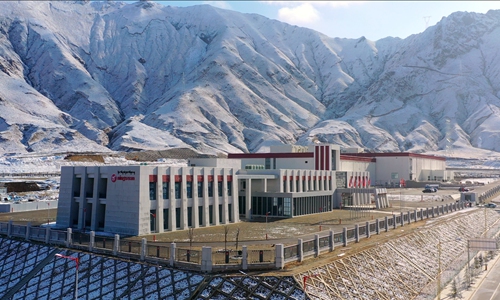
A view of the cloud computing data center in the Liuwu New Area in Lhasa, capital of Southwest China's Tibet Autonomous Region Photo: Courtesy of Ningsuan Technologies
Chinese cloud computing shares rallied on Monday, after news reports of North China's Tianjin Municipality asking local state-owned companies to transfer data from private cloud operators to a state-backed system by next year.
Shares of the cloud computing sector were up 0.93 percent on Monday. Stocks of four companies, including MCC Meili Cloud Computing Industry Investment Co and Inspur Group, surged by the daily limit of 10 percent.
In a widely circulated note online over the weekend, the Tianjin State-owned Assets Supervision and Administration Commission (SASAC) said that local state-owned enterprises (SOEs) should move their data from third-party managed cloud platforms to a state-backed platform within two months of their contracts' expiration.
The document had not been posted on the Tianjin SASAC's official website as of press time on Monday. The Global Times could not independently verify the authenticity of the document.
But the reported move comes as more local governments in China move to establish state-backed cloud systems. As early as September 2020, Southwest China's Chongqing invited bids for an artificial intelligence platform under its state-backed cloud platform. Southwest China's Sichuan Province has also launched a cloud platform specifically for local SOEs.
Experts said that the move was necessary, as the practice of private companies storing SOEs' data might carry potential risks to national security.
"Many domestic traditional private cloud companies' products, ranging from X86 chips to open-source cloud platforms, were supplied by overseas companies. Thus, they don't meet the product localization requirements for China's local governments and SOEs," Wei Bin, chief investment officer at a domestic fund, told the Global Times on Monday.
SOEs' data and data of local government websites often contain core government information, so it must be held by local governments or SOEs, instead of by third-party companies, he said.
Zhang Yi, CEO of iiMedia Research Institute, said that with the government making consistent improvement in information safety regulation and technological support capabilities, the time is ripe for China to tighten requirements for cloud services.
"Many of China's private cloud service platforms have a background of overseas capital, which carries risks to the protection of national security," Zhang told the Global Times.
Although the rise of state-backed cloud systems would put some pressure on third-party cloud companies, it would also bring them market opportunities, analysts said.
"Local governments are always big clients for private cloud companies. The difference is, in the past they sold products to them, but in the future they will sell end solutions or services to them," Wei said.
Zhang said that state-backed and private cloud companies have their own advantages, with state-backed clouds excelling in resource allocation and cybersecurity, while private companies are more flexible in their market mechanism.
"The only thing private cloud companies can do is to enhance competitiveness and adapt to market changes," Zhang said.




